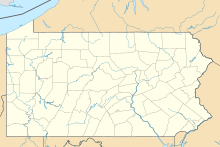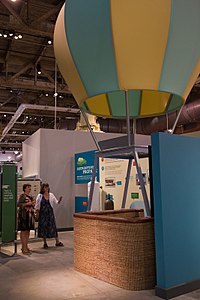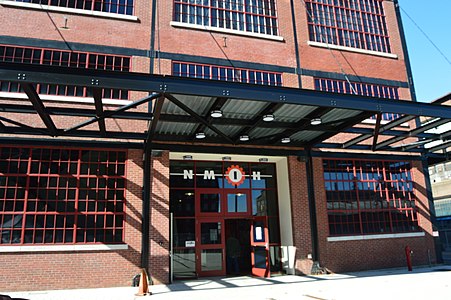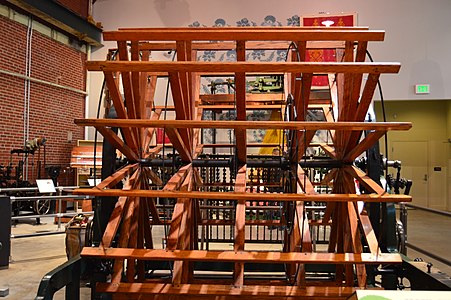National Museum of Industrial History
 The outside of the National Museum of Industrial History in Bethlehem, Pennsylvania | |
 Location within Pennsylvania | |
| Established | 2016 |
|---|---|
| Location | 602 East 2nd Street, Bethlehem, PA 18015 |
| Type | Historical Museum |
| CEO | Kara Mohsinger |
| Curator | Andria Zaia |
| Website | www.nmih.org |
The National Museum of Industrial History (abbreviated NMIH), housed in the former facility of Bethlehem Steel,[1] is a museum affiliated with the Smithsonian Institution that seeks to preserve, educate, and display the industrial history of the nation.[2] It holds a collection of artifacts from the textile, steel and iron, and propane gas industries.[3] The NMIH holds a significant collection of industrial machinery on loan from the Institute's National Museum of American History.[1] The museum also has a large collection of documents, machinery, photographs, and other archival material from Bethlehem Steel.[3]
The museum made its debut in August 2016 with the goal to "forge a connection between America's industrial past and the innovations of today by educating the public and inspiring the visionaries of tomorrow".[4] The $7.5 million museum has four exhibitions each focusing on a different aspect of industrial history that affected both Pennsylvania and the rest of the country.[4] The museum showcases the nation's industrial past by highlighting the machinery and the lives of workers at that time period.[5]
History[]
The National Museum of Industrial History opened in August 2016. The museum's curator of collections, Andria Zaia, stated their goal was "to forge a connection between America's industrial past and the innovations of today by educating the public and inspiring the visionaries of tomorrow."[6] The museum occupies the former Bethlehem Steel plant building, which had been renovated many times in past years. The steel mill has been closed since 1995, but has been brought to life with concerts, historical walking paths and is now a full-time museum.[7] Bethlehem Steel had been the nation's leading shipbuilder and its second leading steel producer.[2] Even though the steel industry has left the Bethlehem area, its history remains. Each of the exhibitions represent a different aspect of industrial history in Pennsylvania and the nation.[7] The museum is the first Smithsonian Affiliate.[7] The museum was proposed in the 1990s, but was sidelined due to legal issues which prevented clearance for opening until 2015. During the first few years they raised nearly $17 million[6] The delay prompted a state grand jury investigation, whose 2014 report concluded the museum suffered from serious mismanagement and wasted public and private funds. The panel referred the matter to the attorney general's office but the Attorney General found no evidence of criminal wrongdoing or misappropriation of funds and concluded the museum was financially viable. Her office gave the museum two years to open or dissolve.[8] Interpretive Planner Rosalind Remer then designed and created the exhibits on time, a feat that should have taken three years according to Aaron Goldblatt, the museum's Design Project Manager.[6]
Exhibitions[]
Machinery Hall[]
The Machinery Hall displays the then-current American industrial technology from the 1876 Centennial International Exposition.[9]

Within this exhibit includes an interactive display of Bethlehem Steel's history of industry dominance to engage the viewers passing by.[10] Other depictions within this display include presentations describing where the produced steel was used and the diversity of origin of their very own workers.[10] Employees hailed from many different countries to work at Bethlehem Steel.[10]
Iron and Steel[]
The Iron and Steel collection celebrates the history of Bethlehem Steel, the location of the museum itself.[4] This collection is a permanent part of the museum and its artifacts are mainly donated by the Bethlehem Steel Corporation.[5] It focuses on the corporation's history with steel-making.[5] This exhibit serves to present insight into the daily lives of workers part of Bethlehem Steel which employed 31,000 people at peak.[4]
The three Bethlehem Steel plant models showcased in this exhibit were used training employees and testing out modifications to the factories.[11] Additionally, the first piece of steel ever made in the Bethlehem Steel mill along with a commemorative anvil.[11] There is also an interactive map which allows users to see the reach Bethlehem Steel had across the United States.[11]
Silk Gallery Hall[]

While the men worked at Bethlehem Steel, women and young children worked at Lehigh Valley Silk Mills which employed even more people than the steel industry did in Bethlehem.[9] The Silk Gallery serves to tell the story of these working women and children.[10] This exhibit, a permanent part of the museum, walks visitors through an interactive process of how silk is made. Visitors are able to experience the work done by workers by holding a 20-pound bobbin tray that children carried for hours at the silk factories.[12] Other tools are on display such as line shafts and looms.[11]
Propane Gallery[]

The Propane Gallery focuses on the workings of Walter O. Snelling, an American chemist from Allentown who discovered how to distill propane.[10] Items from his laboratory are on display at the museum including photos from his propane company, American Gasol Co.[11] Additionally, there is an educational exhibit showing the propane usage in the country during World War II.[11]
Rotating Gallery[]

There is a changing gallery at the NMIH. Currently, this gallery holds 3-D printers, loaned to them by Lehigh University and Northampton Area Community College.[10] There is a schedule planned for the next year that includes commemorating the 75th anniversity of the "E" for Excellence Award.[11] In 1941, the navy gave this award to the Bethlehem Steel Plant because of their 37,778 plus production of ships for the war effort.[11] In May 2017, the NMIH will open a new exhibit called Making America's Pastime which will focus on the production of the MLB equipment and the history behind the success of the MLB.[13]
Artifacts[]
The nearly $7.5 million museum houses over 200 artifacts. One of which is the museum itself, built within the frame of the Steel plant's Electric Repair Shop that ran back in 1913.[14] Within the section involving the 1876 World's Fair, visitors are welcomed by artifacts and machines that were displayed at the Centennial International Exposition.[14] Such machines include massive 19th and 20th century engines and pumps.
After the Centennial International Exposition, most of the machines went directly to the Smithsonian Museum, but the museum has donated several artifacts to Bethlehem's very own. Amy Hollander, executive director of the museum stated in reference to the artifacts, "Among them are some that are the first made, the longest operating or the last produced. These objects are gateways to bigger stories."[14] Amidst first made and last produced include the first piece of steel rolled in Bethlehem and last rolled piece of Class A armor.[14]
The Machinery Hall holds 21 artifacts loaned by the Smithsonian Institution which were previously on display at the National Museum of American History.[10] Items from the 1876 World's Fair in Philadelphia can be found on display in this exhibition.[11] The largest and most prominent artifact in this hall is the 115-ton, 8 MGD, International Steam Pump Company's Snow, Corliss Steam Engine that had pumped water for York, PA beginning in 1914.[4] In addition to the steam engine, the Machinery Hall also boasts a Milwaukee's Pawling & Harnischfeger Co. Crane and an H-beam from Bethlehem Steel.[11] Other artifacts displayed in this hall include original items used by workers such as punch cards, hard hats, whistles, welfare baskets, and safety reports.[10]
The Silk Gallery Hall depicts the history of the Lehigh Valley Silk industry. Within this exhibit, you are greeted by the most prominent artifact, the Jacquard loom.[9] This loom was used in conjunction with the Scalamandre Silk Mill located in Long Island City, New York.[9] It was utilized to produce the fabric for the White House for nearly eighty years up until Bill Clinton's presidency.[9] One particular piece of fabric that was formed for John F. Kennedy holds a place in this exhibit.[9]
In the Propane Gallery, the most prominent display is an interactive hot air balloon simulation.[10] Visitors are able to step into a hot air balloon basket to not only learn about how propane fuels this device but also get a sense of an actual hot air balloon ride.[11] Glenn Koehler, NMIH's marketing and outreach coordinator[15] believes that the Propane Gallery is the most popular interactive exhibit.[9] Mechanical and digital characteristics such as moving floor boards and aerial video give the viewers a very well rounded, realistic approach to a hot air balloon ride.[9] The educational purpose of this display is to express the widespread use of propane gas.[9]
Gallery[]

Steam drop forge at the NMIH

Hot air balloon interactive exhibit

NMIH entrance

Plant display

Jaquard loom

Baseball bat production

Baseball glove production
See also[]
- Technological and industrial history of the United States
- https://www.asme.org/about-asme/who-we-are/engineering-history/landmarks/77-worthington-horizontal-cross-compound-pumping
References[]
- ^ a b "About". nmih.org. National Museum of Industrial History. Retrieved 2016-10-15.
- ^ a b "Exploring Pennsylvania's Industrial Past at the National Museum of Industrial History in Bethlehem - UncoveringPA". UncoveringPA. 2016-09-07. Retrieved 2017-10-30.
- ^ a b Klein, Julia M. (2016-08-23). "Paying Homage to the Building of America at the National Museum of Industrial History". Wall Street Journal. ISSN 0099-9660. Retrieved 2016-09-09.
- ^ a b c d e "Stunning National Museum of Industrial History opens in Bethlehem". Keystone Edge. Retrieved 2017-10-13.
- ^ a b c Radzievich, Nicole. "National Museum of Industrial History to debut after 19 years". themorningcall.com. Retrieved 2017-10-19.
- ^ a b c "Stunning National Museum of Industrial History opens in Bethlehem". Keystone Edge. Retrieved 2017-10-30.
- ^ a b c "Exploring Pennsylvania's Industrial Past at the National Museum of Industrial History in Bethlehem - UncoveringPA". UncoveringPA. 2016-09-07. Retrieved 2017-10-30.
- ^ "Stunning National Museum of Industrial History opens in Bethlehem". Keystone Edge. Retrieved 2017-11-12.
- ^ a b c d e f g h i "Exploring Pennsylvania's Industrial Past at the National Museum of Industrial History in Bethlehem - UncoveringPA". UncoveringPA. 2016-09-07. Retrieved 2017-10-25.
- ^ a b c d e f g h i "National Museum of Industrial History - Lehigh Valley Magazine - January-February 2017 - Lehigh Valley PA". www.lehighvalleymagazine.com. Retrieved 2017-10-19.
- ^ a b c d e f g h i j k Kneller, Ryan. "Insider's Guide: Exploring Bethlehem's National Museum of Industrial History". themorningcall.com. Retrieved 2017-10-25.
- ^ "Industrial museum opens in former Pa. steel plant". The Blade. 2016-08-04. Retrieved 2017-10-25.
- ^ "Making America's Pastime | National Museum of Industrial History". nmih.org. Retrieved 2017-10-25.
- ^ a b c d Radzievich, Nicole. "National Museum of Industrial History to debut after 19 years". themorningcall.com. Retrieved 2017-10-25.
- ^ "Staff | National Museum of Industrial History". nmih.org. Retrieved 2017-10-25.
External links[]
- Museums established in 2016
- Industry museums in Pennsylvania
- 2016 establishments in Pennsylvania
- Bethlehem, Pennsylvania
- Museums in Northampton County, Pennsylvania
- History museums in Pennsylvania
- Smithsonian Institution affiliates







